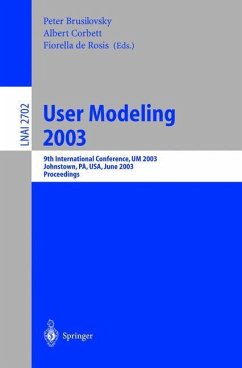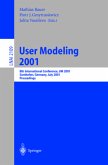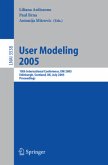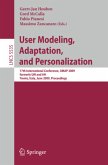Peter Brusilovsky / Albert Corbett / Firoella de Rosis (eds.)9th International Conference, UM 2003, Johnstown, PA, USA, June 22-26, 2003, Proceedings
User Modeling 2003
9th International Conference, UM 2003, Johnstown, PA, USA, June 22-26, 2003, Proceedings
Herausgegeben:Brusilovsky, Peter; Corbett, Albert; de Rosis, Firoella
Peter Brusilovsky / Albert Corbett / Firoella de Rosis (eds.)9th International Conference, UM 2003, Johnstown, PA, USA, June 22-26, 2003, Proceedings
User Modeling 2003
9th International Conference, UM 2003, Johnstown, PA, USA, June 22-26, 2003, Proceedings
Herausgegeben:Brusilovsky, Peter; Corbett, Albert; de Rosis, Firoella
- Broschiertes Buch
- Merkliste
- Auf die Merkliste
- Bewerten Bewerten
- Teilen
- Produkt teilen
- Produkterinnerung
- Produkterinnerung
The International User Modeling Conferences are the events at which research foundations are being laid for the personalization of computer systems. In the last 15 years, the field of user modeling has produced significant new theories and methods to analyze and model computer users in short and long term interactions. A user model is an explicit representation of properties of individual users or user classes. It allows the system to adapt its performance to user needs and preferences. Methods for personalizing human computer interaction based on user models have been successfully developed…mehr
Andere Kunden interessierten sich auch für
![User Modeling 2001 User Modeling 2001]() Mathias Bauer / Piotr J. Gmytrasiewicz / Julita Vassileva (eds.)User Modeling 200141,99 €
Mathias Bauer / Piotr J. Gmytrasiewicz / Julita Vassileva (eds.)User Modeling 200141,99 €![User Modeling 2005 User Modeling 2005]() Liliana Ardissono / Paul Brna / Antonija Mitrovic (eds.)User Modeling 200575,99 €
Liliana Ardissono / Paul Brna / Antonija Mitrovic (eds.)User Modeling 200575,99 €![User Modeling, Adaptation, and Personalization User Modeling, Adaptation, and Personalization]() User Modeling, Adaptation, and Personalization39,99 €
User Modeling, Adaptation, and Personalization39,99 €![Groupware: Design, Implementation, and Use Groupware: Design, Implementation, and Use]() Yannis A. Dimitriadis / Ilze Zigurs / Eduardo Gómez-SánchezGroupware: Design, Implementation, and Use42,99 €
Yannis A. Dimitriadis / Ilze Zigurs / Eduardo Gómez-SánchezGroupware: Design, Implementation, and Use42,99 €![Groupware: Design, Implementation, and Use Groupware: Design, Implementation, and Use]() Joerg M. Haake (Volume ed.) / Sergio F. Ochoa / Alejandra CechichGroupware: Design, Implementation, and Use38,99 €
Joerg M. Haake (Volume ed.) / Sergio F. Ochoa / Alejandra CechichGroupware: Design, Implementation, and Use38,99 €![Groupware: Design, Implementation, and Use Groupware: Design, Implementation, and Use]() Robert O. Briggs / Pedro Antunes / Gert-Jan de et al. Vreede (Volume editor)Groupware: Design, Implementation, and Use39,99 €
Robert O. Briggs / Pedro Antunes / Gert-Jan de et al. Vreede (Volume editor)Groupware: Design, Implementation, and Use39,99 €![Engineering Human Computer Interaction and Interactive Systems Engineering Human Computer Interaction and Interactive Systems]() Rémi Bastide / Philippe Palanque / Jörg Roth (eds.)Engineering Human Computer Interaction and Interactive Systems41,99 €
Rémi Bastide / Philippe Palanque / Jörg Roth (eds.)Engineering Human Computer Interaction and Interactive Systems41,99 €-
-
-
The International User Modeling Conferences are the events at which research foundations are being laid for the personalization of computer systems. In the last 15 years, the field of user modeling has produced significant new theories and methods to analyze and model computer users in short and long term interactions. A user model is an explicit representation of properties of individual users or user classes. It allows the system to adapt its performance to user needs and preferences. Methods for personalizing human computer interaction based on user models have been successfully developed and applied in a number of domains, such as information filtering, adaptive natural language and hypermedia presentation, tutoring systems, e commerce and medicine. There is also a growing recognition of the need to evaluate the results of new user modeling methods and prototypes in empirical studies and a growing focus on evaluation methods. New trends in HCI create new and interesting challenges for user modeling. While consolidating results in traditional domains of interest, the user modeling field now also addresses problems of personalized interaction in mobile and ubiquitous computing and adaptation to user attitudes and affective states. Finally, with the spread of user modeling in everyday applications and on the Web, new concerns about privacy preservation are emerging. All these topics are covered in the proceedings of UM 2003, the 9th International Conference on User Modeling.
Hinweis: Dieser Artikel kann nur an eine deutsche Lieferadresse ausgeliefert werden.
Hinweis: Dieser Artikel kann nur an eine deutsche Lieferadresse ausgeliefert werden.
Produktdetails
- Produktdetails
- Lecture Notes in Computer Science 2702
- Verlag: Springer / Springer Berlin Heidelberg / Springer, Berlin
- Artikelnr. des Verlages: 978-3-540-40381-4
- 2003
- Seitenzahl: 456
- Erscheinungstermin: 5. Juni 2003
- Englisch
- Abmessung: 235mm x 155mm x 25mm
- Gewicht: 684g
- ISBN-13: 9783540403814
- ISBN-10: 3540403817
- Artikelnr.: 23418080
- Herstellerkennzeichnung Die Herstellerinformationen sind derzeit nicht verfügbar.
- Lecture Notes in Computer Science 2702
- Verlag: Springer / Springer Berlin Heidelberg / Springer, Berlin
- Artikelnr. des Verlages: 978-3-540-40381-4
- 2003
- Seitenzahl: 456
- Erscheinungstermin: 5. Juni 2003
- Englisch
- Abmessung: 235mm x 155mm x 25mm
- Gewicht: 684g
- ISBN-13: 9783540403814
- ISBN-10: 3540403817
- Artikelnr.: 23418080
- Herstellerkennzeichnung Die Herstellerinformationen sind derzeit nicht verfügbar.
Peter Brusilovsky, University of Pittsburgh, PA, USA / Albert Corbett, Carnegie Mellon University, Pittsburgh, PA, USA / Firoella de Rosis, University of Bari, Italy
Abstracts of Invited Talks.- Adaptive Interfaces for Ubiquitous Web Access.- Computers That Recognize and Respond to User Emotion.- The Advantages of Explicitly Representing Problem Spaces.- Adaptive Hypermedia.- The Three Layers of Adaptation Granularity.- Adaptive Presentation of Multimedia Interface Case Study: "Brain Story" Course.- Discovering Prediction Rules in AHA! Courses.- Adaptive Web.- Word Weighting Based on User's Browsing History.- SNIF-ACT: A Model of Information Foraging on the World Wide Web.- Adapting to the User's Internet Search Strategy.- Learning a Model of a Web User's Interests.- Modelling Users' Interests and Needs for an Adaptive Online Information System.- Declarative Specifications for Adaptive Hypermedia Based on a Semantic Web Approach.- Natural Language and Dialog.- Emotional Dialogs with an Embodied Agent.- Evaluating a Model to Disambiguate Natural Language Parses on the Basis of User Language Proficiency.- Incorporating a User Model into an Information Theoretic Framework for Argument Interpretation.- Using Dialogue Games to Maintain Diagnostic Interactions.- Plan Recognition.- Extending Plan Inference Techniques to Recognize Intentions in Information Graphics.- Leveraging Collaborative Effort to Infer Intent.- Plan Recognition to Aid the Visually Impaired.- Evaluation.- Performance Evaluation of User Modeling Servers under Real-World Workload Conditions.- Evaluating the Inference Mechanism of Adaptive Learning Systems.- The Continuous Empirical Evaluation Approach: Evaluating Adaptive Web-Based Courses.- Emerging Issues of User Modeling.- Privacy Preservation Improvement by Learning Optimal Profile Generation Rate.- Interfaces for Eliciting New User Preferences in Recommender Systems.- Modeling Multitasking Users.- VlUM, aWeb-Based Visualisation of Large User Models.- A Multiagent Approach to Obtain Open and Flexible User Models in Adaptive Learning Communities.- A Model for Integrating an Adaptive Information Filter Utilizing Biosensor Data to Assess Cognitive Load.- Ontology-Based User Modeling for Knowledge Management Systems.- Group Modeling and Cooperation.- Motivating Cooperation on Peer to Peer Networks.- Discourse Analysis Techniques for Modeling Group Interaction.- Group Decision Making through Mediated Discussions.- Modeling Task-Oriented Discussion Groups.- Modeling the Multiple People That Are Me.- Applications.- Iems: Helping Users Manage Email.- Modelling Reputation in Agent-Based Marketplaces to Improve the Performance of Buying Agents.- Customising the Interaction with Configuration Systems.- Does Adapted Information Help Patients with Cancer?.- Empirical Evaluation of Adaptive User Modeling in a Medical Information Retrieval Application.- Multivariate Preference Models and Decision Making with the MAUT Machine.- Student Modeling Methods.- Predicting Student Help-Request Behavior in an Intelligent Tutor for Reading.- A Comparative Analysis of Cognitive Tutoring and Constraint-Based Modeling.- Assessing Student Proficiency in a Reading Tutor That Listens.- Adaptive Bayes for a Student Modeling Prediction Task Based on Learning Styles.- User Modeling and Problem-Space Representation in the Tutor Runtime Engine.- A Neuro-fuzzy Approach in Student Modeling.- Learning Environments: Natural Language and Pedagogy.- Student Modeling for an Intelligent Agent in a Collaborative Learning Environment.- A Teaching Model Exploiting Cognitive Conflict Driven by a Bayesian Network.- Towards Intelligent Agents for Collaborative Learning: Recognizing the Roles of Dialogue Participants.- Modeling Student Performance to Enhance the Pedagogy of AutoTutor.- Modeling Hinting Strategies for Geometry Theorem Proving.- Mobile and Ubiquitous Computing.- User Modelling in the Car.- User Modelling and Mobile Learning.- D-ME: Personal Interaction in Smart Environments.- A User Modeling Markup Language (UserML) for Ubiquitous Computing.- Purpose-Based User Modelling in a Multi-agent Portfolio Management System.- User Modeling in Adaptive Audio-Augmented Museum Environments.- Doctoral Consortium Papers.- MAPS: Dynamic Scaffolding for Independence for Persons with Cognitive Impairments.- Adaptations of Multimodal Content in Dialog Systems Targeting Heterogeneous Devices.- Learning Knowledge Rich User Models from the Semantic Web.- Modeling User Navigation.- A Longitudinal, Naturalistic Study of Information Search & Use Behavior as Implicit Feedback for User Model Construction & Maintenance.- Facilitating the Comprehension of Online Learning Courses with Adaptivity.- Scrutable User Models in Decentralised Adaptive Systems.- A Pseudo-Supervised Approach to Improve a Recommender Based on Collaborative Filtering.- Visualizing a User Model for Educational Adaptive Information Retrieval.
Abstracts of Invited Talks.- Adaptive Interfaces for Ubiquitous Web Access.- Computers That Recognize and Respond to User Emotion.- The Advantages of Explicitly Representing Problem Spaces.- Adaptive Hypermedia.- The Three Layers of Adaptation Granularity.- Adaptive Presentation of Multimedia Interface Case Study: "Brain Story" Course.- Discovering Prediction Rules in AHA! Courses.- Adaptive Web.- Word Weighting Based on User's Browsing History.- SNIF-ACT: A Model of Information Foraging on the World Wide Web.- Adapting to the User's Internet Search Strategy.- Learning a Model of a Web User's Interests.- Modelling Users' Interests and Needs for an Adaptive Online Information System.- Declarative Specifications for Adaptive Hypermedia Based on a Semantic Web Approach.- Natural Language and Dialog.- Emotional Dialogs with an Embodied Agent.- Evaluating a Model to Disambiguate Natural Language Parses on the Basis of User Language Proficiency.- Incorporating a User Model into an Information Theoretic Framework for Argument Interpretation.- Using Dialogue Games to Maintain Diagnostic Interactions.- Plan Recognition.- Extending Plan Inference Techniques to Recognize Intentions in Information Graphics.- Leveraging Collaborative Effort to Infer Intent.- Plan Recognition to Aid the Visually Impaired.- Evaluation.- Performance Evaluation of User Modeling Servers under Real-World Workload Conditions.- Evaluating the Inference Mechanism of Adaptive Learning Systems.- The Continuous Empirical Evaluation Approach: Evaluating Adaptive Web-Based Courses.- Emerging Issues of User Modeling.- Privacy Preservation Improvement by Learning Optimal Profile Generation Rate.- Interfaces for Eliciting New User Preferences in Recommender Systems.- Modeling Multitasking Users.- VlUM, aWeb-Based Visualisation of Large User Models.- A Multiagent Approach to Obtain Open and Flexible User Models in Adaptive Learning Communities.- A Model for Integrating an Adaptive Information Filter Utilizing Biosensor Data to Assess Cognitive Load.- Ontology-Based User Modeling for Knowledge Management Systems.- Group Modeling and Cooperation.- Motivating Cooperation on Peer to Peer Networks.- Discourse Analysis Techniques for Modeling Group Interaction.- Group Decision Making through Mediated Discussions.- Modeling Task-Oriented Discussion Groups.- Modeling the Multiple People That Are Me.- Applications.- Iems: Helping Users Manage Email.- Modelling Reputation in Agent-Based Marketplaces to Improve the Performance of Buying Agents.- Customising the Interaction with Configuration Systems.- Does Adapted Information Help Patients with Cancer?.- Empirical Evaluation of Adaptive User Modeling in a Medical Information Retrieval Application.- Multivariate Preference Models and Decision Making with the MAUT Machine.- Student Modeling Methods.- Predicting Student Help-Request Behavior in an Intelligent Tutor for Reading.- A Comparative Analysis of Cognitive Tutoring and Constraint-Based Modeling.- Assessing Student Proficiency in a Reading Tutor That Listens.- Adaptive Bayes for a Student Modeling Prediction Task Based on Learning Styles.- User Modeling and Problem-Space Representation in the Tutor Runtime Engine.- A Neuro-fuzzy Approach in Student Modeling.- Learning Environments: Natural Language and Pedagogy.- Student Modeling for an Intelligent Agent in a Collaborative Learning Environment.- A Teaching Model Exploiting Cognitive Conflict Driven by a Bayesian Network.- Towards Intelligent Agents for Collaborative Learning: Recognizing the Roles of Dialogue Participants.- Modeling Student Performance to Enhance the Pedagogy of AutoTutor.- Modeling Hinting Strategies for Geometry Theorem Proving.- Mobile and Ubiquitous Computing.- User Modelling in the Car.- User Modelling and Mobile Learning.- D-ME: Personal Interaction in Smart Environments.- A User Modeling Markup Language (UserML) for Ubiquitous Computing.- Purpose-Based User Modelling in a Multi-agent Portfolio Management System.- User Modeling in Adaptive Audio-Augmented Museum Environments.- Doctoral Consortium Papers.- MAPS: Dynamic Scaffolding for Independence for Persons with Cognitive Impairments.- Adaptations of Multimodal Content in Dialog Systems Targeting Heterogeneous Devices.- Learning Knowledge Rich User Models from the Semantic Web.- Modeling User Navigation.- A Longitudinal, Naturalistic Study of Information Search & Use Behavior as Implicit Feedback for User Model Construction & Maintenance.- Facilitating the Comprehension of Online Learning Courses with Adaptivity.- Scrutable User Models in Decentralised Adaptive Systems.- A Pseudo-Supervised Approach to Improve a Recommender Based on Collaborative Filtering.- Visualizing a User Model for Educational Adaptive Information Retrieval.








